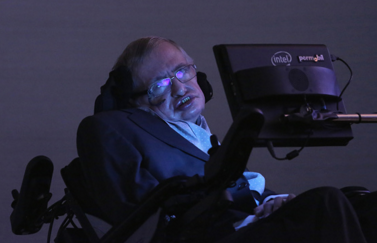Stephen Hawking, already revered by the masses, entered a new tier of mythos last year after he was portrayed in “The Theory of Everything.” He was seen (via the performance of Eddie Redmayne) as a star-crossed lover who managed to win the girl — for a time — and survive decades past his expiration date. And yet, his life has been marked by scientific discoveries most of us can only pretend to comprehend and that are little-referenced in the film. Certainly, Stephen Hawking is this century’s great mind — our Albert Einstein. More than in physics, though, he has proved to be an adept thinker and a scholarly futurist. The inimitable Hawking holds in his theorems and treatises a more-or-less simple truth that will, if heeded, save humanity.
Because Hawking is not content with the unknowable, he has proven to be a pretty good theoretician when it comes to normal aspects of human life. To wide-spread approval and disapproval, he has disclaimed the possibility of heaven or an afterlife. Like computers, he says, our brains shut down once we’ve crossed the wide black yonder — and that’s it. A “creator” is unnecessary to Hawking, who gives credence instead to spontaneous generation and the ability of science to explain all. This pronouncement, while controversial, sets and cements a precedent normal to the Hawking philosophy: that humans can (and should) be able to go it alone and survive as a species.
This is not to say that Hawking doesn’t also believe that humans should be mindful of our flaws and excesses. In one of his more harrowing predictions, Hawking said: “Although the chance of disaster to planet Earth in a given year may be quite low, it adds up over time, and becomes a near certainty in the next thousand or ten thousand years.” The potential causes of Earth’s destruction on Hawking’s list include mostly man-made calamities, such as “nuclear war, global warming and genetically-engineered viruses.” Right now, given an existential dread not uncommon to twenty-somethings and certainly not assuaged by the “nuke ‘em” rhetoric of Ted Cruz and other fundamental extremists, it’s not hard to envision Hawking’s premonitions of humanity’s nuclear or virus-stricken future.
I have made the argument in previous articles that humanity’s hope is in the stars. I loved Ridley Scott’s “The Martian”; it made me want to travel to space, be resourceful, embody the best qualities of our potential. I’ve had discussions about recent space-enterprises like those ventured by SpaceX, Mars One and Blue Origin. I’ve heard (and gladly agree with, to an extent) the argument that humans should invest time, energy and attention into revitalizing the earth rather than abandoning the planet we’re destroying in our own ignorance. Yet I also believe reaching for the sky, considering all that EPA regulations and sustainability initiatives will at this point do to reverse the problem, is our best shot at avoiding what Hawking calls humanity’s inevitable “mother of all goals.” This boils down to the argument that by forcing ourselves to colonize places like, say, Mars, we learn to be resourceful, to conserve, to cultivate, to self-sustain, to subsist rather than indulge and to put our eggs in more than one basket.
Hawking is quick to point out the threat of alien life. Remarking on this issue, with the self-deprecating tone significant only in a person qualified to speak for much of the species, he says of aliens and humans: “If aliens visit us, the outcome would be much as when Columbus landed in America, which didn’t turn out well for the Native Americans. We only have to look at ourselves to see how intelligent life might develop into something we wouldn’t want to meet.”
But the threat isn’t solely “out there.” Hawking’s recurring message is to explore space and to sustain human life in as many places we can (ideally without disturbing the natural or unnatural environments of those places we make home), because humans are themselves inanely unpredictable. How many steps are we away from disaster? How many millennia (or centuries) might we have left until the end of Earth is imminent? I recognize the futility of such a diagnosis on such a platform as this, but I say that in order to survive as a species there are two things humans might do: 1) Quit the idea that we will ever reach the Singularity (the moment Artificial Intelligence becomes a reality — a prospect both Hawking and Elon Musk warn against); and 2) Develop life-bearing outposts/civilizations on other planets.
Only in this final suggestion, however, will we be able to know that long after we’re gone, humanity’s survival won’t have to depend on the kinds of people predisposed to aiming nuclear arms at one another.

















